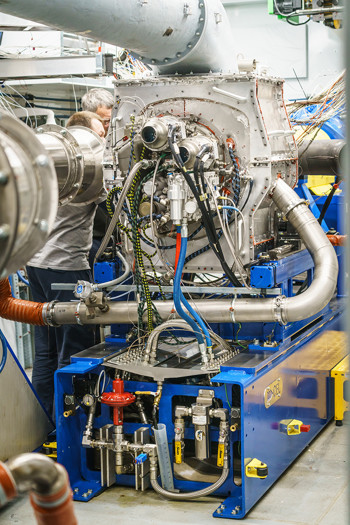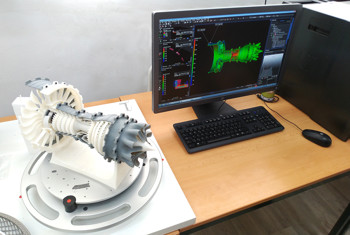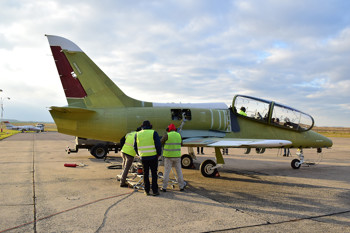Design engineering and mechatronics
Tutor: prof. Ing. Zbyněk Šika, Ph.D.
Design Engineering and Mechatronics is a doctoral study programme built with regard to the needs of future employers and their demand for highly qualified professionals capable of conducting both basic and applied research and development, converting knowledge into reality with a focus on industries related to the design and mechatronics of transport machinery and equipment, manufacturing machines and equipment, robots, manipulators, instrumentation and other equipment. The concept of the studies emphasizes scientific research and independent creative effort, taking into account strong interdisciplinary links among the specific segments of modern mechanical engineering.
 The ultimate goal is to improve the functional characteristics of machines and equipment of various types by employing new
machine concepts, non-traditional construction features, non-conventional materials and mechatronic solutions, including massive
combinations of new sensors and actuators. Emphasis is put on harmonizing the quality of designs of mechanical and optical
parts of machines and devices, instrumentation by means of sensors and actuators, as well as on rational introduction of automated
control and artificial intelligence. The studies and thesis are to focus in depth on the integration of complex simulations
and optimization of simulation models into machine design. Simulation models supporting the design are developed up to the
"Digital Twin" level. Overall links with the Industry 4.0 concept play an important role. With regard to this approach, the
studies are more oriented towards research topics relating to robotics integration, ergonomics and human-machine cooperation,
or predictive maintenance. In manufacturing machinery, attention is paid to precision and quality with an emphasis put on
integrated dimensional and quality control, productivity, reliability, minimization of environmental impacts and current research
topics, such as machine multifunctionality, opportunities for combining traditional machining and additive manufacturing in
one machine, or laser technology. The topics of the studies and theses also include development of experimental activities
for the verification of computing models or acquisition of operational data from monitored machines.
The ultimate goal is to improve the functional characteristics of machines and equipment of various types by employing new
machine concepts, non-traditional construction features, non-conventional materials and mechatronic solutions, including massive
combinations of new sensors and actuators. Emphasis is put on harmonizing the quality of designs of mechanical and optical
parts of machines and devices, instrumentation by means of sensors and actuators, as well as on rational introduction of automated
control and artificial intelligence. The studies and thesis are to focus in depth on the integration of complex simulations
and optimization of simulation models into machine design. Simulation models supporting the design are developed up to the
"Digital Twin" level. Overall links with the Industry 4.0 concept play an important role. With regard to this approach, the
studies are more oriented towards research topics relating to robotics integration, ergonomics and human-machine cooperation,
or predictive maintenance. In manufacturing machinery, attention is paid to precision and quality with an emphasis put on
integrated dimensional and quality control, productivity, reliability, minimization of environmental impacts and current research
topics, such as machine multifunctionality, opportunities for combining traditional machining and additive manufacturing in
one machine, or laser technology. The topics of the studies and theses also include development of experimental activities
for the verification of computing models or acquisition of operational data from monitored machines.
 In the field of transport machinery and equipment, emphasis is put on compliance with the requirements for optimal use of
resources, protection of the environment and a complex approach to vehicles as parts of larger transportation systems. Much
attention is paid to the mechatronics and autonomous driving of vehicles. Thus, much emphasis is put on general principles
that do not become obsolete as well as on modern approaches rapidly expanding in the field of transportation technology. These
include research in mechatronic components and a combination of experiments with virtual reality in new designs (CAD) and
advanced simulation procedures (CAx - finite element method and multibody models in solid phase mechanics MBS, computational
gas dynamics CFD, 1D powertrain simulations, driving based on models and rapid development of simulations combined with physical
reality - HiL, SiL CAT, etc.). Numerous new impulses in the field of hybrid drives, autonomous driving and in combining the
virtual and real world can be expected to originate from the Industry 4.0 initiative. In aviation and space technology, an
important goal is technology development in view of the European and global competition in respect of designing and producing
aircraft, space objects and their system equipment. These particularly include specific jet structures and impacts on them,
space aerodynamics, internal flows and thermodynamics in jet and rocket propulsion units, flight performance and characteristics
of solid and flexible flying apparatuses, strength, fatigue and aeroelastic characteristics of aerostructures and space structures,
and active vibration attenuation of structures. Also, the studies are oriented towards innovations of aerostructures, particularly
employing modern composite materials, and experimental aerodynamic and both static and dynamic strength research in structures.
In the field of transport machinery and equipment, emphasis is put on compliance with the requirements for optimal use of
resources, protection of the environment and a complex approach to vehicles as parts of larger transportation systems. Much
attention is paid to the mechatronics and autonomous driving of vehicles. Thus, much emphasis is put on general principles
that do not become obsolete as well as on modern approaches rapidly expanding in the field of transportation technology. These
include research in mechatronic components and a combination of experiments with virtual reality in new designs (CAD) and
advanced simulation procedures (CAx - finite element method and multibody models in solid phase mechanics MBS, computational
gas dynamics CFD, 1D powertrain simulations, driving based on models and rapid development of simulations combined with physical
reality - HiL, SiL CAT, etc.). Numerous new impulses in the field of hybrid drives, autonomous driving and in combining the
virtual and real world can be expected to originate from the Industry 4.0 initiative. In aviation and space technology, an
important goal is technology development in view of the European and global competition in respect of designing and producing
aircraft, space objects and their system equipment. These particularly include specific jet structures and impacts on them,
space aerodynamics, internal flows and thermodynamics in jet and rocket propulsion units, flight performance and characteristics
of solid and flexible flying apparatuses, strength, fatigue and aeroelastic characteristics of aerostructures and space structures,
and active vibration attenuation of structures. Also, the studies are oriented towards innovations of aerostructures, particularly
employing modern composite materials, and experimental aerodynamic and both static and dynamic strength research in structures.
 As part of equipment design, the studies and theses focus on various types of mechanical or optical sensors and devices, ranging
from single-purpose devices such as position sensors, pressure meters, refractometers and similar to complex systems, such
as microscopes, spectrometers, particle detectors, chromatographs and more. Other key topics include special knowledge in
the field of miniaturization of optical and mechanical elements, design of devices for vacuum or cryogenic applications, capacities
of numeric simulations of the functioning of specific functional units of devices, including capacities for designing and
incorporating instrumentation into complex process units. The studies also focus on the use of special materials suitable
for optical, vacuum or medicinal applications, anti-backlash positioning methods, integration with controlling systems or
special technology to realize innovative device designs.
As part of equipment design, the studies and theses focus on various types of mechanical or optical sensors and devices, ranging
from single-purpose devices such as position sensors, pressure meters, refractometers and similar to complex systems, such
as microscopes, spectrometers, particle detectors, chromatographs and more. Other key topics include special knowledge in
the field of miniaturization of optical and mechanical elements, design of devices for vacuum or cryogenic applications, capacities
of numeric simulations of the functioning of specific functional units of devices, including capacities for designing and
incorporating instrumentation into complex process units. The studies also focus on the use of special materials suitable
for optical, vacuum or medicinal applications, anti-backlash positioning methods, integration with controlling systems or
special technology to realize innovative device designs.
The Design Engineering and Mechatronics doctoral study programme aims at educating professionals having specific knowledge and skills and being capable of creating new original outcomes in R&D to turn such into commercial practice. In addition, some of the programme graduates are expected to continue in the basic research and to support its international competitiveness in mechanical engineering.
Graduate profile
Design Engineering and Mechatronics graduates are capable of carrying out research & development to consequently transfer the interdisciplinary insights to the industry, particularly in construction and overall design of transport machinery and equipment of various types, manufacturing machines and equipment, robots, manipulators, instrumentation and other equipment. The graduates become professionals possessing profound and sought-after knowledge and skills in new machine and device design, supported by experience from scientific and research activities. Also, they are able to respond to current market needs with regard to the implementation of Industry 4.0, mechatronics, modern sensors, additive technology, smart transportation or space technology. Relying on the key competences learned, they are able to develop and apply the gained knowledge and skills beyond the framework of the narrower professional focus of their specific doctoral research.
Doctoral graduates possess profound knowledge to complete the most challenging research tasks as well as experience with the latest experimental and diagnostic methods and world-class pilot and operating equipment. This allows them to tackle complex tasks in development of new technology and equipment on a theoretical level as well as to experimentally verify their conclusions by designing and realizing experimental equipment, conducting an evaluation and producing generalized results. Given the complexity of the latest technology that the education focuses on, emphasis is placed on strengthening the links among the particular areas of the doctoral study programme as well as on fostering interdisciplinary connections on the level of related fields. Relying on this knowledge, graduates are able to comprehensively solve, objectively evaluate and formulate the attained original results of scientific research assignments. Also, they are able to present or realize the same on an international scale, taking into account intellectual property issues. Programme graduates are suitable candidates for jobs in the field of industrial research and development, new technology design and implementation, and management of complex industrial systems. Other opportunities can be found in the academic sector and other institutions focused on science, R&D and innovations on the national and international level.
Admission requirements
- The fundamental condition for admission is a completed master’s degree in a field related to the thesis topic.
- Properly completed application form, submitted in due time and manner.
- Original of a proof of completed university education (i.e. diploma or diploma amendment), or a certified copy of the same, presented to the Science and Research Department of the Faculty of Mechanical Engineering of CTU, Prague.
- The entrance test is oral, mostly covering three subjects selected in a manner to allow the candidate to demonstrate knowledge of the theoretical basics of the doctoral study programme. The examination also includes oral verification of the candidate’s past professional activities, current level of language skills and orientation in the chosen thesis topic. Admission is based on a consensus of the examination board members as to whether the candidate has the capacity to successfully graduate and complete the thesis. Where multiple candidates apply for one announced topic, the board sets the order of successful applicants and recommends the first-ranking candidate for studies. As part of the admission examination and in accordance with the Study and Examination Rules, the tutor has the right to veto an admission decision in respect of a topic proposed by such tutor.
![[design/2014/cvut-logo-en-white.png]](https://fs.cvut.cz/content/images/design/2014/cvut-logo-en-white.png)
![[design/2014/cvut-logo-en-print.jpg]](https://fs.cvut.cz/content/images/design/2014/cvut-logo-en-print.jpg)